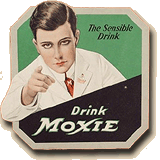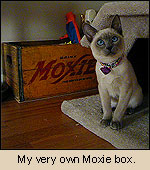|
As I said on my
main page,
Moxie is one of America's original soft drinks.
If you want to get technical, you could call it America's
"oldest continually sold commercially marketed carbonated drink".
Moxie
was made in Lowell, Massachusetts by Doctor Augustin Thompson's Moxie Nerve Food Company
and was originally introduced into apothecary shops in 1876 as a "nostrum", which meant
that it was stronger than a tonic and thus would be taken one spoonful at a time.
It was first sold as a carbonated drink in 1884.
It is interesting to note that Moxie was later also the first carbonated beverage to offer a sugar-free version.

The cure-all medicinal claims made on the original Moxie labels were quite incredible indeed:
Contains not a drop of Medicine, Poison, Stimulant or Alcohol.
But is a simple sugarcane-like plant grown near the Equator and farther south, was lately
accidentally discovered by Lieut. Moxie and has proved itself to be the only
harmless nerve food known that can recover brain and nervous exhaustion, loss of manhood,
imbecility and helplessness. It has recovered paralysis, softening of the brain,
locomotor ataxia, and insanity when caused by nervous exhaustion. It gives a
durable solid strength, makes you eat voraciously, takes away the tired, sleepy,
listless feeling like magic, removes fatigue from mental and physical over work at once,
will not interfere with action of vegetable medicines.
Moxie's main ingredient, gentian root, gives it a strong medicinal smell and flavor.
Gentian is supposed to help digestion and soothe the stomach.
The drink is also said to contain wintergreen and it used to contain sassafras
before its use in food products was outlawed in the 1960's.
Most people say that Moxie is an acquired taste, indeed one of the advertising slogans of old
for the drink was "LEARN To Drink Moxie".
Free Moxie Lollipops were given out to children to acquaint them with the taste.
Even though the 1906 Pure Food and Drug Act prevented the company from making any unsubstantiated claims,
in some places still today Moxie is taken as a tonic when one feels under the weather.
As for the word "Moxie" itself - it is said to be a
Native American word meaning "dark water".
There were many places around Dr. Thompson's native Maine named with this word such as
Moxie Lake, Moxie Pond, Moxie Bog, Moxie Cove, Moxie Reef, Moxie Falls, and Moxie Mountain.
There is an Algonquin Indian word "maski", meaning "medicine",
which also could have been the origin of the name.
Dr. Thompson no doubt believed that giving an Indian name to his product would lend it a
mystique and perhaps imply that it contained Indian medicines.
Moxie was the nation's first mass-marketed soft drink thanks to the head of its
advertising campaign Frank M. Archer. Archer had started out as a clerk at the company
and worked his way up into the position, where his advertising program made Moxie
America's most popular soft drink up until the 1920's.
A common sight in Moxie advertising was the "Moxie Man", said to be a likeness of Archer himself.
He showed up on much of the advertising material, often pointing a finger and admonishing the
reader to "Drink Moxie".
A pioneering Moxie soda-pop commercial
song
was produced in 1904 for the St. Louis World's fair, with
lyrics that went:

...just make it Moxie for Mine,
For the strenuous life it is fine.
It's a drink that they serve,
Which will build up your nerve.
So just make it Moxie for Mine!
 As I mentioned on the
main page
this song is the origin for my full registered CFA name: "Lyttle-Paws Moxie For Mine".
My owners even bought me a bona-fide old wooden Moxie bottle crate, it's where I keep my toys!
As I mentioned on the
main page
this song is the origin for my full registered CFA name: "Lyttle-Paws Moxie For Mine".
My owners even bought me a bona-fide old wooden Moxie bottle crate, it's where I keep my toys!
Frank Archer also took advantage of the advent of the automobile by seizing the chance
to use them for advertising purposes. Around 1915, he created a fleet of
"Moxiemobiles",
also known as the "Moxie Horsemobiles".
It consisted of a fake horse mounted on an automobile, from which the driver steered the car.
You could say these cars were certainly no longer "horseless carriages".
They were certainly attention-grabbers when they showed up at parades and fairs.
There are only a few Moxiemobiles around today, either one of the restored originals or replicas.
Eventually, someone who exhibited an uncommon degree of spirit or nerve was said to be "full of Moxie".
Thus, the popular American word "moxie" was born.
It can also mean "aggressive energy or initiative" or "skill & know-how".
Moxie outsold Coca Cola up until the 1920's. However, when sugar prices
skyrocketed, the company made the same decision that a lot of soft drink producers made
at the time -- they bought large quantities to protect themselves from future price increases.
When sugar prices soon collapsed, they were forced to sell their products at a loss.
The loss of revenue also meant cutbacks in advertising and, along with the
onset of the Great Depression, the lack of marketing meant sales declined dramatically and never recovered.
Moxie is still available at some stores, mostly around New England, and is also available from
some sources by mail order (see links below).
 Moxie
Moxie™, Moxie™ Logos and the "Moxie Man" are registered trademarks of Monarch Beverages, Inc., Atlanta, Georgia.
LINKS
On This Site:
Other Web Sites:
|




